Transform Your Skills & Save up to 60%
✨ CYBER MONDAY DEALS ARE HERE! *Offer ends Oct. 28 Save Now at LF Education
The post Transform Your Skills & Save up to 60% appeared first on Linux.com.
✨ CYBER MONDAY DEALS ARE HERE! *Offer ends Oct. 28 Save Now at LF Education
The post Transform Your Skills & Save up to 60% appeared first on Linux.com.
1 December 2024 Unifont 16.0.02 is now available. This is a minor release with many glyph improvements. See the ChangeLog file for details.
Download this release from GNU server mirrors at:
https://ftpmirror.gnu.org/unifont/unifont-16.0.02/
or if that fails,
https://ftp.gnu.org/gnu/unifont/unifont-16.0.02/
or, as a last resort,
ftp://ftp.gnu.org/gnu/unifont/unifont-16.0.02/
These files are also available on the unifoundry.com website:
https://unifoundry.com/pub/unifont/unifont-16.0.02/
Font files are in the subdirectory
https://unifoundry.com/pub/unifont/unifont-16.0.02/font-builds/
A more detailed description of font changes is available at
https://unifoundry.com/unifont/index.html
and of utility program changes at
https://unifoundry.com/unifont/unifont-utilities.html
Information about Hangul modifications is at
https://unifoundry.com/hangul/index.html
and
The Brunei Darussalam, Indonesia, Malaysia, Philippines – Eastern ASEAN Growth Area (BIMP-EAGA) Friendship Games’ opening ceremony was held at the Edward S. Hagedorn Coliseum in Puerto Princesa on December 1, 2024.
Running until December 5, this would be the 11th edition of the tournament and the first since 2018 when Malaysia claimed the overall championship in Brunei.
Aiming to achieve sports excellence and to fortify the friendship of the countries, a total of 502 athletes, 356 of them coming from the Philippines, battle in eight sporting events —archery, athletics, badminton, esports, karate, pencak silat, sepak takraw, and swimming.
Video by Niel Victor Masoy
Subscribe to The Manila Times Channel – https://tmt.ph/YTSubscribe
Visit our website at https://www.manilatimes.net
Follow us:
Facebook – https://tmt.ph/facebook
Instagram – https://tmt.ph/instagram
Twitter – https://tmt.ph/twitter
DailyMotion – https://tmt.ph/dailymotion
Subscribe to our Digital Edition – https://tmt.ph/digital
Sign up to our newsletters: https://tmt.ph/newsletters
Check out our Podcasts:
Spotify – https://tmt.ph/spotify
Apple Podcasts – https://tmt.ph/applepodcasts
Amazon Music – https://tmt.ph/amazonmusic
Deezer: https://tmt.ph/deezer
Tune In: https://tmt.ph/tunein
#themanilatimes
#philippines
#tmtnews
#sports
Author: Source Read more
#SnehaPaul #Trending #2024 #BollywoodCountry #BollywoodNews #BollywoodGossips #BollywoodUpdates #BollywoodNews #Bollywood #Bollywoodcelebrity #BollywoodHindiNews #ians
Want to find out which pages on your website are blocked from indexing on Google? In this video, I’ll show you how to use Say V to quickly identify pages that are restricted from being indexed and how to resolve the issues to boost your site’s visibility on search engines.
Indexing is a critical factor in SEO, and ensuring your important pages are accessible to Google can make or break your site’s performance. Using Say V, you’ll be able to scan your site, detect blocked pages, and understand whether the issues stem from robots.txt, meta tags, or other settings.
Don’t forget to subscribe and hit the bell icon to stay updated on more SEO and website optimization tips. If this video helps, give it a thumbs up and share it with others!
In this video, you’ll learn:
How to use Say V to detect pages blocked from indexing.
Common reasons why pages may be blocked, including robots.txt and noindex tags.
Tips to resolve indexing issues and improve your site’s visibility.
Don’t miss more tutorials on the channel:
https://www.youtube.com/c/ItayVerchik?sub_confirmation=1
To Sign Up For The Keywords Tracking System:
https://say-v.com/
Join now the community of Webmasters and SEO Marketers completely free:
https://www.facebook.com/groups/itayverchik
To purchase Elementor Pro, the world’s best WordPress page designer:
https://trk.elementor.com/2500
Don’t Have A Web Hosting Account Yet Or Are You Just Not Satisfied With Your Existing Hosting?
Get A 25% Discount For Cloudways Web Hosting For The First 3 Months:
https://platform.cloudways.com/signup?id=314159&coupon=VERCHIK
Thank you for watching!
If you have any questions or suggestions for future topics, drop a comment below. Don’t forget to subscribe and share this video with others interested in improving their website’s SEO!
One of the common needs, or at least desires, for CRM users is to link their CRM to some kind of constituent portal. There are several ways your can architect a good data pattern for your constituent portal. The trick is picking the right one for your organization.
This is the first in a series on what your choices are, and now to select the right one. The architecture you select will drive the implementation cost, maintenance costs, and scalability.
Before deciding on the architecture of your portal, you need to have a clear understanding of its intended purpose and expected scale. The purpose of the portal will also dictate the direction(s) data flows, and the scale will help you plan the long term costs.
If you can’t clearly state why you need a constituent portal, you don’t need one.
Different organizations have different reasons to create portals. Companies that sell products may want a warranty or support portal. Nonprofits often want a donor portal that provides tax recipes and allowed recurring donors to update their gift information. Member organizations want a place for members to see their benefits, update their information, and renew their memberships. And so on.
The purpose of your portal will determine the direction that data flows through it. There are essentially three directions that data can move.
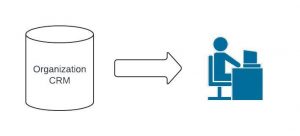
You can send data from your organization to your constituent. That could be things like receipts, memberships status, or product warranty information. Anything that is data you have, that your member might need to see, but not update.
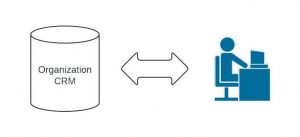
You can allow constituents to update information. That could be address changes, support requests, donation schedule updates, event registration details, and more.
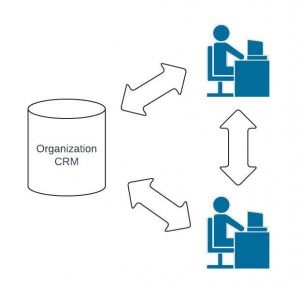
Your third option is to allow you constituents to exchange information with each other. This could be a any form of member community where they engage with each other.
When planning a network, remember you have to plan for content moderation and acceptable use policies.
To support your portal, whatever the data flow is, there are three main data architectures you can choose from, each which a different strengths and weaknesses. The more complex your architecture the more options you will have for what it can support, but it will also increase costs and maintenance efforts. Bigger is not always better – sometimes it’s just more expensive.
In an all-in-one solution your constituent portal is part of your CRM. For obvious reasons this is the type of portal that your CRM vendor wants to sell you. In Salesforce land this means Experience Cloud. There are also many nonprofit-focused CRMs which include one in their solution. When your portal is part of your CRM you get a bunch of advantages:
There are also downsides:
In this pattern an external constituent portal moves the user experience from within your main CRM’s sphere of influence into a separate platform. In my career I’ve mostly built these with Salesforce as the CRM and Drupal as the portal platform – it’s a powerful pairing. The strengths and weaknesses here are more or less the mirror of the all-in-one portal.
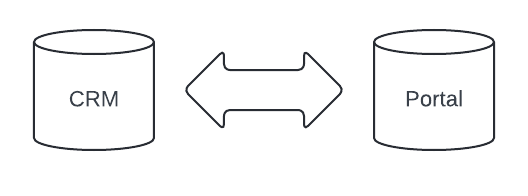
The downsides:
In some situations it makes sense to insert a data proxy, or API layer, between your main CRM and your constituent portal. This creates a layer of abstraction, security, and data augmentation that can benefit a lot of organizations. While this is the most complex of the three main architectures it is one I find is frequently overlooked – in part, I suspect, because no one partner benefits from selling it.
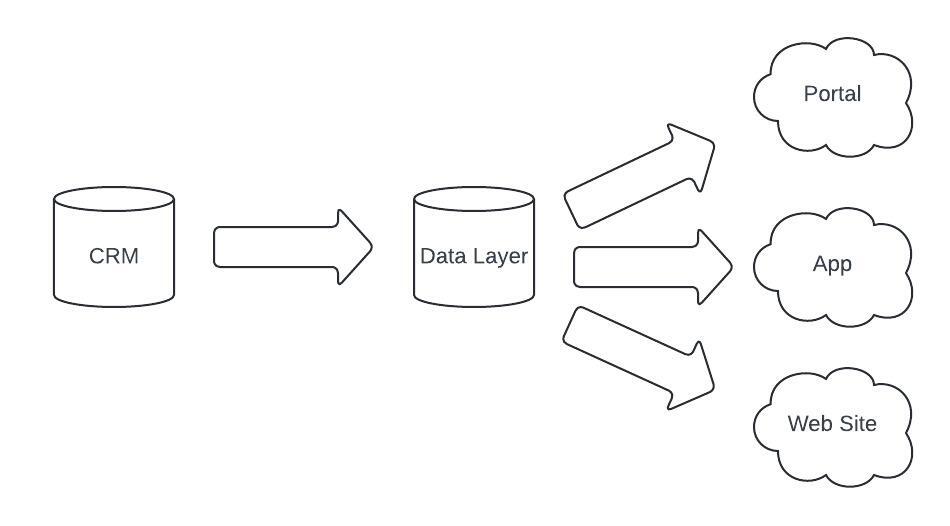
This setup certainly isn’t for everyone, but when it’s the right fit it makes a huge difference. It also creates a significant number of iterations – all of those arrows could be one directional or two directional.
An extra data layer makes the most sense when data from your CRM is going to multiple places and/or needs to be augmented by an external data source. For example think about an organization that provides trail maps for hiking or paddling. All that data about trails does not need to be in your CRM, but you probably want to know which members are interested in which trails. An organization like that may have a portal for members, a web site to find trails for non-members, apps for iPhone and Android, and perhaps a public API for other people to use to build their own web sites with. That’s a lot of API calls all with different data sets, all of which need to be very fast.
Your CRM is designed to be very stable and reliable – it is not designed to be very fast. What’s more, you often have limits on the number of API calls you get in your package with extra fees charged if you go over. By inserting another layer between your CRM and other needs you can bypass these limitations.
There is another added benefit to this design pattern, and that is increased security. By creating an additional layer in your system you are able to create a separation of concerns between the various systems. Each should have access to only the data is absolutely needs from any of the others.
There are lots of considerations that go into selecting the right architecture for your project – which is why that’s getting it’s own post soon.
The post Architectures for Constituent Portals appeared first on Spinning Code.
The initial list of 21 ‘low hanging fruit’ videos from EuroBSDcon 2024 has been released with more to follow:
Here is the EuroBSDcon 2024 playlist.
The OpenBSD highlights include:
Confidential Computing with OpenBSD – Hans Jörg Höxer
Building a SD-WAN appliance suitable for Australian Health Sector NFP/NGO – Jason Tubnor
A Packet’s Journey Through the OpenBSD Network Stack – Alexander Bluhm
OpenBSD vs. IPv6 – Florian Obser
Global anycast using OpenBSD on a budget – Rob Keizer
Why rewrite fw_update(8)? – Andrew Hewus Freshbr>
vmd’s multi-process device emulation: 2 releases later – Dave Voutila
The rest (see the conference schedule) will appear soon, pending some necessary post-processing.
Enjoy this bunch, and do come back for the rest soon!
Hello,
The F-Droid Board’s first effort to start an F-Droid Community Council – an
important step toward ensuring a safe, constructive, and empowered community
– was not successful despite an excellent initial group of members and a
strong desire all around to see the effort succeed. After reflection and
discussion, we have learned some lessons from this experience, including
about how to set up newly elected Council members for success. With that in
mind, we are ready to open a new call for nominations for the Community
Council.
The Community Council will primarily be responsible for enforcing the Code
of Conduct (CoC). As part of
that responsibility, the Council will be charged with drafting new language
for the Code of Conduct and establishing content guidelines for applications
published by F-Droid. This first Council will also help to build out
protocols and establish precedent for how the Community Council relates to
the project, the community, and the Board.
In order to execute its responsibilities, the CC will be given requisite
permissions to moderate in all official F-Droid channels. Of particular
note, CC members will receive developer privileges on F-Droid Gitlab
repositories to be used only for moderation purposes because Gitlab lacks a
specific moderator role.
In addition to enforcing the Code of Conduct and helping establish the
Community Council as an institution, prospective Council members should also
be willing and able to mediate conflicts and disagreements before they rise
to the level of Code of Conduct violations. As such, they should be
trusted, established members of the community with at least “Reporter”
status on Gitlab. They should also be willing to listen to multiple parties
in disagreements and seek the most equitable solution for the given
circumstances.
If these traits and roles fit you or someone you know, first ensure your
nominee is willing and able to fill the position, then email elections {at} with your nomination. The nomination should describe the
f-droid {dot} org
nominee and their relationship to F-Droid, why they consider the Council
important, and a summary of past experience or skills relevant to this
position. Nominations will close on December 15th, 2024.
Once nominations are closed, the Board will announce nominees and accept
community feedback until January 1st, 2025. The Council members will then
be appointed at the next Board meeting, subject to Board review.
We hope to hear from you soon!
Thanks, Juliana Sims, on behalf of the F-Droid Board of Directors